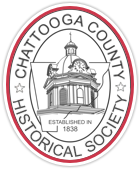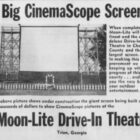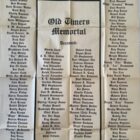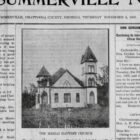Robert Floyd Remembers the 5 and 10 cent store
Several years ago Mr. Robert Floyd sat down with Historical Society President Gene McGinnis to talk about Christmas. Mr. Floyd and his late wife, Helen Murdock Floyd, first moved from Dalton to Chattooga County in 1948. After several transfers in the retail business, Mr. Floyd moved his family back to Chattooga County in 1957. Here they brought up their four children—Bobby, Jerry, Susan and Kathy. Through the years, the Floyd have been active members at Summerville First Baptist Church and, later, at Horizon Baptist Fellowship.
Mr. Floyd is one of the most recognizable members of the Chattooga County Historical Society because of his longtime career in retail business in the county. In Chattooga County, through the years he managed a W.W. Mac Store, the Southern 5 & 10 and Super D before retiring in 1992. The younger generation cannot likely comprehend the wonder of a dime store for children in the 1940s through 1970s. It was a much more interesting place than today’s dollar stores and the overwhelming Wal-Mart.
Mr. Floyd began his work in the five and dime industry as a stock boy at the age of 15. He remembers fondly the gentleman who gave him that job, Mr. Friar, who said “I’m going to give you a job just to prove you are too lazy to work!” Apparently he did work. Mr. Friar had a secretary/bookkeeper, a lovely young lady named Helen Murdock.
She and Robert Floyd were married in 1945 at what had by then become the W.W. Mac Store. Mr. Floyd sees his association with W.W. Mac as divine providence for it provided the opportunity to meet his dear companion of over fifty years—until Helen Murdock Floyd passed away in January 2007.
Mr. McGinnis asked Mr. Floyd about what he remembered about the W.W. Mac Store, his first job in Summerville. Mr. Floyd recalled, “Well, I know it had a tall ceiling, wasn’t very wide, and had a center counter with aisles on both sides. We had windows facing Commerce Street and had to trim them with revolving merchandise displays.”
“At Christmas time, the window would be filled with things related to Christmas—decorations, toys, etc. In those days before artificial Christmas trees, we carried strings of electric lights, icicles, angel hair and glass beads. In those days, the Christmas displays didn’t start until after Thanksgiving. Today, the Christmas displays go up the day after Halloween and sometimes earlier!”
“We sold Christmas decorations – and sometimes had to deal with broken glass balls. We had no Christmas trees. Christmas tree lights were temperamental and people returned lights. Years later, we sold silver aluminum trees, complete with rotating color wheel!”
Later on, the store would have Santa Claus there to meet the children, take their lists and have their pictures made. “Joe Wiley was the designated Santa Claus at Super D.” Mr. Wiley had both the stature and the patient demeanor to make an excellent Santa Claus. From time to time, as today, children were terrified of Santa and it took a lot of
calming and coaxing to get them to tell him about their wish lists.
Mr. Floyd has many memories of the goodness of people in Chattooga County. One cold Christmas Eve, finally able to close the store, Mr. Floyd arrived home about 9:30 he helped decorate the Christmas tree and immediately went to bed. At 12:30 a.m., a man called to say he knew of a destitute family whose children would not receive any Christmas gifts. He asked if Mr. Floyd would come and open the store. The man bought over $100 for people in need—a great deal of money in those days. “Another generous man who shopped at Super-D was Riley Parham. Riley would buy . for families that had nothing for Christmas.”
When Mr. Floyd arrived, W.W. Mac was the only dime store in Summerville. At W.W. Mac, they carried many products priced at five or ten cents. They carried hardware, clothes, window shades, cleaning supplies, toiletries and a few toys. At that time they did not carry bicycles. Most of the toys were wooden because of the need for metal during the just-ended World War II. Cashiers had to be trained to use the old multi-button cash registers that required you to plug in the dollar amount and then the cents.
Mr. Floyd recalled that, in the W.W. Mac days in the late 1940s, he had to erect a Christmas tree on top of the store as part of a merchants’ contest. He did not say whether his tree won the $50 prize!
Candy, like today, was a big seller. Mr. Floyd recalled “We sold loose candy that folks could buy by weight. We’d use a dipper and measure out 25 or 50 cents worth of chocolate peanuts, orange slices, hot peanuts, and chocolate drops.” The popcorn machine came later and on most Saturdays, one of the young ladies who worked at Southern 5 and 10 would staff the popper on the sidewalk in front of the store. Mr. Floyd remembered several employees from that era. Jane Stephenson Petitt and Shirley Ray Fisher and others worked there at the time.
Gene McGinnis told Mr. Floyd he recalled the boxes of chocolate-covered cherries sold at his store. “We would draw names at school to buy a gift for a classmate. The spending limit was 50 cents so we always bought each other 49 cent boxes of chocolate-covered cherries.
After Mr. Floyd came back to Chattooga County in 1957 to work at Southern 5 and 10, they began to sell bicycles. It was around that time that layaway programs started. Many people would make the suggested periodic payments but many more would wait and “pay out” their layaway on Christmas Eve—the busiest day of the year. Mr. Floyd recounted, “I hired young boys to put together the bikes. Popular toys for boys included G.I. Joe, cap guns with holsters, jacks, marbles, wagons and scooters. Girls loved dolls—Barbie, Raggedy Ann, Betsy-Wetsy and paper dolls were big sellers. All the children, and some adults, enjoyed bolo bouncers, yoyos, Lincoln Logs, pedal cars and board games.
Five and Ten Cent Stores hold special places in memories of the over-50 set. In earlier times, they provided quality merchandise at low prices. The dime store was also a hub for music and Mr. Floyd’s store did a good business in 33 and 45 RPM records. The busiest day was Saturday. Farm people would come to town for the day on Saturday. The store usually stayed open from about 8:30 a.m. to 6:00 p.m. They ran many sales. In later years, they ran advertisements in the newspaper and on radio. “Children miss a lot from not experiencing five and ten stores but we have to remember 1950 was very different from today.”
At Southern Five and Ten, Mr. Floyd’s sales volume was much greater than it had been at W.W. Mac. Henry Everett was in the dime store business for quite a few years and Mr. Floyd recalls his years working with Mr. Everett. Mr. Everett’s wife, Elizabeth Scott Everett, was another longtime employee (until 1989) who worked with Mr. Floyd. Another longtime employee was Pauline Anderson. At one time, prior to Southern Five and Ten, Mrs. Everett’s maiden sister, Miss Janie Scott, ran the U.S. Five and Ten Cent Store—in the location that soon became Fuller Jewelry and is today the County Extension Office.
Redford’s was the competing dime store in the Chattooga County market. Mr. Floyd emphasizes that it was a friendly competition. Redford’s was located on East Washington Street next to the longtime location of the M&M Café. Sam Hancock ran Redford’s and is to this day a good friend of Mr. Floyd.
Asked about the different departments of the store, Mr. Floyd immediately tells you his favorite department. “I liked working in the hardware and keeping all the shelves straightened.” Parking meters came in the 1950s. Hinton Logan is remembered as the man who marked tires with chalk to determine whether a car had overstayed and by how long.
Asked for his recollections of longest-serving employee, Miss Reo Beavers, Mr. Floyd laughs and says “Reo was there for a hundred years—or at least from the store’s opening until retirement.” Her passion was the toy department and the children enjoyed her personality immensely. Reo, who was the younger sister of Mrs. Mary Beavers Weems, longtime postal employee, never learned to drive. The sisters lived together and Mrs. Weems did the driving. Reo would walk from the family home on Martin Street to work every day, with her ever-present cigarette. Reo was a loyal employee, “She would come as early as you asked her and stay as long as you needed her.”
Mr. Floyd recalled life in a small town county seat. There were regulars who appeared at the Courthouse, across from his store every day. Will and Eli Stephenson, noted entrepreneurs in the county, ran a taxi service that operated primarily from the parking area on the north side of the courthouse. After the Super-D installed a snack bar, they began to get regulars as well—like the unforgettable Nell Barrett Taylor and Edythe Hamner McGinnis.
There were other interesting town people. Homer Sanders and his red wagon is vivid in Mr. Floyd’s and others’ minds. Mr. Floyd still sees a lot of people who were customers who tell him they miss the Super D and other businesses that are no more. Many of the interesting citizens of those days are gone but a few remain. Mr. Floyd mentioned Mrs. J.B. Woodard who recently turned 101 years old. She remains sharp as a tack and Mr. Floyd still speaks with her by phone occasionally. She still attends the Methodist Church in Summerville and loves the Atlanta Braves—as does Mr. Floyd.
Mr. Floyd fondly remembers McGinnis and Jackson Drugstores, Pesterfield’s, the Home Store, the Cash Store and the Western Auto. He also recalled the Summerville Diner, Alexander’s Café, the Jiffy Burger and Hartline’s Shoe Shop. He recalled Mr. Frank Sturdivant shining shoes in the Star Barber Shop—and Frank’s aversion to two dollar bills. Other businesses that are long-gone but still remembered by Mr. Floyd and others include Lowry’s Department Store, Garnett’s Furniture, the Malcolm Thomas Agency, the State Café, Packer’s Shoes, Cato’s ladies wear, the Ideal Shop, Bagley’s Service Station, Roland Henry’s store, the Sinclair Station, and the building that housed dentist Berlon Lovinggood and physician Hugh Goodwin.
Shoplifting was not a problem in the early years, certainly not as it is today. The first shoplifters Mr. Floyd remembers were spotted by Mrs. Ruthie Bennett Groce, a Historical Society member who worked at Southern at the time. Mr. Floyd called the local police and gave chase. Local policeman, Griffin Pledger, responded. Apparently the culprits knew they were being pursued for, when the afternoon brought the shift change at the Montgomery Knitting Mill, Mrs. Burgess came next door to tell Mr. Floyd his stolen merchandise had been found tossed under the car of one of the mill employees.
Mr. Floyd was often asked about the mechanical horse he purchased from J.B. Woodard in the 1960s. Mr. Woodard ran the Cash Store and had the horse in his garage. He agreed to sell it to Mr. Floyd for $50. Mr. Floyd replaced its missing saddle and it was a fixture at Southern and Super-D for the next twenty years. The horse was named Sandy and over the years a ride on Sandy went from a dime to a quarter. When the store in Summerville closed and Mr. Floyd moved to the Trion store in 1989, he sold the horse to a man in Dalton. Years later, Mr. Floyd’s daughter, Susan, was browsing in an antique shop in Dalton, and there was Sandy. Susan asked how much the dealer wanted for the horse. The asking price was $3,500.
Christmas Parades were a big event for the store each year. They came along after Mr. Floyd’s years at the W.W. Mack Store. Mr. Floyd was proud to have been involved in the early years of the Halloween Walk in Summerville. At a late 1970s meeting of downtown merchants and the Chamber of Commerce, then under the leadership of Sue Spivey, Larry Howard suggested the Halloween Walk for the county’s children as a safer alternative to trick or treating.
The Floyds’ children all worked in the dime store at one time and they have very happy memories of it. The youngest, Kathy, prior to receiving her Master’s degree, eventually managed the Trion Super-D. The inevitable demise of the dime store came on the heels of the arrival of WalMart. Mr. Floyd was philosophical about it all and, while he has happy memories, he was very much involved in today’s Chattooga County and in his church.




